| ||||||||||||||||||||||||||||
PHOTOGRAPHY MONOGRAPHS
|
|
STATUS: Forthcoming | 2/3/2026 This title is not yet published in the U.S. To pre-order or receive notice when the book is available, please email orders @ artbook.com |
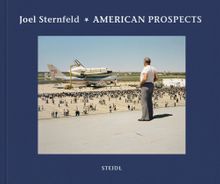 Joel Sternfeld: American Prospects
Joel Sternfeld: American Prospects
Non Plus Ultra Edition
Published by Steidl.
Joel Sternfeld’s seminal American Prospects is firmly embedded in the history of the photobook. In 1978, Sternfeld left New York and headed out into the American landscape. At the time he thought he would follow the seasons for a year, but his journey lasted six years. Capturing two 8 x 10 negatives a day, Sternfeld story-boarded at night in his Volkswagen camper.
This new edition of American Prospects is larger than all past editions, designed to make small details in the frame more legible. The pandemic years gave Sternfeld a chance to revisit all the negatives in his studio; this edition contains some of these as yet unpublished discoveries. “Little did I know that many of the aspects of the so-called Reagan Revolution, the union busting, the erosion of the quality of life of the middle class and the even less privileged, a turning to the right altogether, would continue unbroken to the present,” says Sternfeld. “This edition may reflect this understanding.”
Joel Sternfeld was born in New York City in 1944. He has received numerous awards including two Guggenheim Fellowships, a Prix de Rome and the Citibank Photography Award. Sternfeld holds the Nobel Foundation Chair in Art and Cultural History at Sarah Lawrence College.
PUBLISHER
Steidl
BOOK FORMAT
Slip, clth, 16.5 x 13.75 in. / 176 pgs / 84 color.
PUBLISHING STATUS
Pub Date 2/3/2026
Forthcoming
DISTRIBUTION
D.A.P. Exclusive
Catalog: FALL 2024 p. 69
PRODUCT DETAILS
ISBN 9783969991398 TRADE
List Price: $175.00 CAD $265.00
AVAILABILITY
Awaiting stock
STATUS: Forthcoming | 2/3/2026 This title is not yet published in the U.S. To pre-order or receive notice when the book is available, please email orders @ artbook.com |
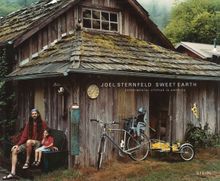 Joel Sternfeld: Sweet Earth
Joel Sternfeld: Sweet Earth
Published by Steidl.
While the early social theorists were largely European, it was in the fluid environment of young America that true utopian communities were built and utopian experimentation flourished. In the years between 1810 and 1850, hundreds of secular and religious societies bravely tried to build a “perfect” life for their members. In the twentieth century, experimentation began again, reaching a fever pitch in the turbulent days of the Vietnam War. Some of the late-1960s communes still survive and continue to flourish. The 1990s and the early years of the new millennium have become yet another hotbed of social experimentation. The co-housing movement is sweeping America with at least 70 communities fully completed and occupied and numerous others planned. At the same time, the rapid global expansion of sustainable communities known as ecovillages has been widely adopted in America.
This book by one of America's foremost artists includes a photograph of each community and is accompanied by brief text that summarizes the most salient aspects of the history or organization. A book that functions both as art, as well as a hopeful guide to alternative ways of life.
PUBLISHER
Steidl
BOOK FORMAT
Clth, 12 x 10 in. / 132 pgs / 60 color.
PUBLISHING STATUS
Pub Date 2/3/2026
Forthcoming
DISTRIBUTION
D.A.P. Exclusive
Catalog: FALL 2015 p. 91
PRODUCT DETAILS
ISBN 9783958290211 TRADE
List Price: $65.00 CAD $87.00
AVAILABILITY
Awaiting stock
STATUS: Forthcoming | 2/3/2026 This title is not yet published in the U.S. To pre-order or receive notice when the book is available, please email orders @ artbook.com |
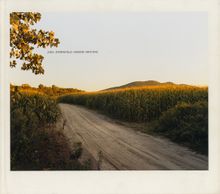 Joel Sternfeld: Oxbow Archive
Joel Sternfeld: Oxbow Archive
Published by Steidl.
PUBLISHER
Steidl
BOOK FORMAT
Clth, 12.75 x 11.25 in. / 144 pgs / 77 color.
PUBLISHING STATUS
Pub Date 2/3/2026
Forthcoming
DISTRIBUTION
D.A.P. Exclusive
Catalog: FALL 2015 p. 91
PRODUCT DETAILS
ISBN 9783958290204 TRADE
List Price: $75.00 CAD $99.00
AVAILABILITY
Awaiting stock
STATUS: Forthcoming | 2/3/2026 This title is not yet published in the U.S. To pre-order or receive notice when the book is available, please email orders @ artbook.com |
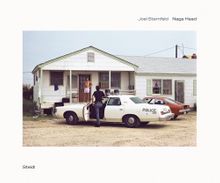 Joel Sternfeld: Nags Head
Joel Sternfeld: Nags Head
Published by Steidl.
Text by Joel Sternfeld.
In the summer of 1975, facing surgery with the potential of paralysis, a young Joel Sternfeld went off in search of a last idyll—and found it in Nags Head, on North Carolina’s Outer Banks. From June to August he captured the beach town floating in time, a sense of spatial and temporal fluidity. Sternfeld’s images show beachgoers of all ages enjoying scenes of leisure and partying in what became his first body of work addressing a season.
Yet this summer sojourn was tragically broken by the news of the death of his brother; Sternfeld returned to New York, never to go back to Nags Head. Eventually he began working again and one day ventured to Rockaway Beach, Queens. Here he took a picture in which “all at once the ugly scene appeared beautiful to me”: the hues of sand, apartments and sky fuse into a cohesive whole. This photo, with its conceptual roots in Nags Head, would lead to the color structures of Sternfeld’s magnum opus American Prospects, his ambitious realization of what he had always wanted to do: follow the seasons across America.
A major figure in the photography world for nearly five decades, Joel Sternfeld was born in New York City in 1944. He has received numerous awards, including two Guggenheim fellowships, a Prix de Rome and the Citibank Photography Award. Sternfeld holds the Nobel Foundation Chair in Art and Cultural History at Sarah Lawrence College.
PUBLISHER
Steidl
BOOK FORMAT
Hardcover, 12 x 10 in. / 96 pgs / 70 color / 1 bw.
PUBLISHING STATUS
Pub Date 6/25/2024
Active
DISTRIBUTION
D.A.P. Exclusive
Catalog: SPRING 2024 p. 10
PRODUCT DETAILS
ISBN 9783969993187 TRADE
List Price: $55.00 CAD $79.00
AVAILABILITY
In stock
in stock $55.00 Free Shipping UPS GROUND IN THE CONTINENTAL U.S. |
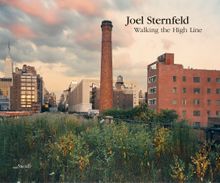 Joel Sternfeld: Walking the High Line
Joel Sternfeld: Walking the High Line
Revised Edition
Published by Steidl.
Text by Adam Gopnik, John Stilgoe.
With nine additional photos, a larger format and an expanded, up-to-date timeline, this is the new and revised edition of Joel Sternfeld’s Walking the High Line, which documents the overgrown elevated freight rail line above New York’s West Side before it was transformed into the cherished High Line public park in 2009.
In the dark days following the September 11 attacks in New York in 2001, Joel Sternfeld came to Gerhard Steidl with the hope of quickly making a book. For the previous two years Sternfeld had been photographing the abandoned railroad and working with a group, the Friends of the High Line, that wanted to save it and turn it into a park. Powerful real estate and political interests seeking to tear it down and commercially develop the land beneath it were using the chaos of the period to rush forward their plans. Steidl agreed—six weeks later there were finished books in New York. It was a small volume but it played a crucial role in allowing New Yorkers to see for the first time the beauty of a secret railroad in all the seasons.
Like the photographs made by William Henry Jackson in the 1870s of Yellowstone that led Congress to establish a national park, the pictures proved pivotal in the making of the High Line’s reputation.
PUBLISHER
Steidl
BOOK FORMAT
Clth, 11.75 x 9.75 in. / 80 pgs / 49 color / 6 bw.
PUBLISHING STATUS
Pub Date 12/12/2023
Active
DISTRIBUTION
D.A.P. Exclusive
Catalog: FALL 2020 p. 36
PRODUCT DETAILS
ISBN 9783958297647 TRADE
List Price: $45.00 CAD $65.00
AVAILABILITY
In stock
in stock $45.00 Free Shipping UPS GROUND IN THE CONTINENTAL U.S. |
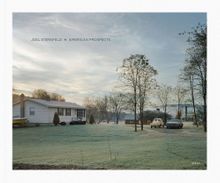 Joel Sternfeld: American Prospects
Joel Sternfeld: American Prospects
Published by Steidl.
Text by Andy Grundberg.
Born of a desire to follow the seasons up and down America, and equally to find lyricism in contemporary American life despite all its dark histories, American Prospects has enjoyed a life of acclaim. Its pages are filled with unexpected excitement, despair, tenderness and hope. Its fears are expressed in beauty, its sadnesses in irony. Oddly enough, the society it seems to presage has now come to be; the ideas of this book bespeak our present moment.
Often out of print, this new edition of Joel Sternfeld’s seminal book returns to the format of the original 1987 edition. All of the now classic images within it—alongside a group of never published photographs—examine a once pristine land safeguarded by Indigenous peoples who needed no lessons in stewardship, and a land now occupied by a mix of peoples hoping for salvation within the fraught paths of late capitalism. The result suggests a vast nation whose prospects have much to do with global prospects, a “teenager of the world” unaware of its strengths, filled with idealism and frequent failings. These pictures see all but judge not.
Joel Sternfeld was born in New York City in 1944. He has received numerous awards including two Guggenheim fellowships, a Prix de Rome and the Citibank Photography Award. Sternfeld holds the Nobel Foundation Chair in Art and Cultural History at Sarah Lawrence College. His books published by Steidl include American Prospects (2003), Sweet Earth (2006), Oxbow Archive (2008), First Pictures (2012), Landscape as Longing (2016) with Frank Gohlke, Rome after Rome (2019) and Our Loss (2019).
PUBLISHER
Steidl
BOOK FORMAT
Hardcover, 12 x 10 in. / 108 pgs / 52 color.
PUBLISHING STATUS
Pub Date 12/12/2023
Active
DISTRIBUTION
D.A.P. Exclusive
Catalog: SPRING 2024 p. 9
PRODUCT DETAILS
ISBN 9783969992296 TRADE
List Price: $50.00 CAD $73.00
AVAILABILITY
Out of stock
STATUS: Out of stock Temporarily out of stock pending additional inventory. |
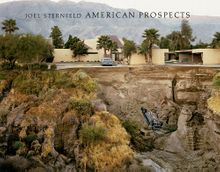 Joel Sternfeld: American Prospects
Joel Sternfeld: American Prospects
Published by Steidl.
Text by Kerry Brougher, Andy Grundberg, Anne W. Tucker.
First published in 1987 to critical acclaim, the seminal American Prospects has been likened to Walker Evans’ American Photographs and Robert Frank’s The Americans in both its ability to visually summarize the zeitgeist of a decade and to influence the course of photography following its publication.
This definitive edition of American Prospects contains 12 new pictures, most of which have neither been published nor exhibited. Freed from the size constraints of previous editions, Sternfeld includes portraits and portraits in the landscape that elucidate the human condition in America. The result is a more complex and rounded view of American society that strongly anticipates Sternfeld’s Stranger Passing series (1985–2000) and links the two bodies of work.
A major figure in the photography world, Joel Sternfeld was born in New York City in 1944. He has received numerous awards, including two Guggenheim fellowships, a Prix de Rome and the Citibank Photography Award. Sternfeld’s books published by Steidl include American Prospects (2003), Sweet Earth (2006), Oxbow Archive (2008), First Pictures (2012) and Landscape as Longing (2016) with Frank Gohlke.
PUBLISHER
Steidl
BOOK FORMAT
Clth, 15 x 11.75 in. / 152 pgs / 70 color.
PUBLISHING STATUS
Pub Date 2/11/2020
Out of print
DISTRIBUTION
D.A.P. Exclusive
Catalog: SPRING 2020 p. 34
PRODUCT DETAILS
ISBN 9783958296695 TRADE
List Price: $125.00 CAD $175.00
AVAILABILITY
Not available
STATUS: Out of print | 00/00/00 For assistance locating a copy, please see our list of recommended out of print specialists |
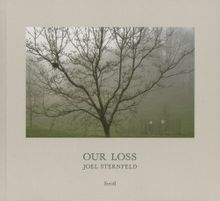 Joel Sternfeld: Our Loss
Joel Sternfeld: Our Loss
Published by Steidl.
In the early morning of 14 April 2018, David Buckel walked into Prospect Park in Brooklyn and set himself alight. He was a distinguished attorney whose work to secure social justice and LGBT rights had won national acclaim. At the time of his death at the age of 60 Buckel had left the practice of law and was working on a community farm in Red Hook, Brooklyn.
In an email sent to the New York Times moments before his death, Buckel decried the increasing pollution of the earth. He expressed the hope that his death by fossil fuels would encourage others to be better stewards of the earth. Joel Sternfeld happened to be in Prospect Park on that day with his nine-year-old son. Returning the next day, he began to document the gradual regeneration of the site as a means to honor the hope that climate change might be reversed. Our Loss is the latest book by Sternfeld on the effects of climate change, following Oxbow Archive (2008) and When It Changed (2008).
PUBLISHER
Steidl
BOOK FORMAT
Clth, 12 x 11 in. / 156 pgs / 74 color.
PUBLISHING STATUS
Pub Date 9/17/2019
Active
DISTRIBUTION
D.A.P. Exclusive
Catalog: SPRING 2020 p. 92
PRODUCT DETAILS
ISBN 9783958296589 TRADE
List Price: $50.00 CAD $69.95
AVAILABILITY
In stock
in stock $50.00 Free Shipping UPS GROUND IN THE CONTINENTAL U.S. |
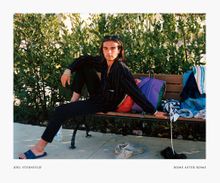 Joel Sternfeld: Rome after Rome
Joel Sternfeld: Rome after Rome
Published by Steidl.
Text by Theodore E. Stebbins Jr.
The Campagna—the countryside south and east of Rome—occupies a special place in Roman (and human) history. With the rise of Ancient Rome, this once polluted, malarial landscape was restored by emperors and thrived, with some 20 towns and numerous wealthy villas on the rolling plains among the mighty aqueducts that fed water to Rome. After the city fell, the Campagna once again became desolate and dangerous. Sternfeld updates this history for the contemporary eye.
PUBLISHER
Steidl
BOOK FORMAT
Clth, 19 x 15.75 in. / 112 pgs / 74 color.
PUBLISHING STATUS
Pub Date 11/12/2019
Active
DISTRIBUTION
D.A.P. Exclusive
Catalog: SPRING 2017 p. 134
PRODUCT DETAILS
ISBN 9783958292635 TRADE
List Price: $95.00 CAD $130.00
AVAILABILITY
In stock
in stock $95.00 Free Shipping UPS GROUND IN THE CONTINENTAL U.S. |
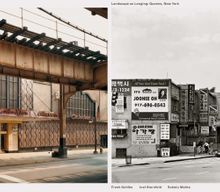 Frank Gohlke & Joel Sternfeld: Landscape as Longing
Frank Gohlke & Joel Sternfeld: Landscape as Longing
Published by Steidl.
Text by Joel Sternfeld, Suketu Mehta.
Gohlke’s Queens consists of streets, houses, fences, gardens, parklands, shorelines and waste spaces, the territory where human arrangement contends endlessly with the forces that undo it: unruly vegetation, weather, rot and decay.
Sternfeld focuses on the borough’s shops, restaurants, mosques and temples. With an essay by acclaimed writer Suketu Mehta, this book becomes a powerful instrument for understanding a landscape that seems to defy interpretation.
PUBLISHER
Steidl
BOOK FORMAT
Clth, 11 x 12.5 in. / 180 pgs / 36 color / 38 bw.
PUBLISHING STATUS
Pub Date 4/25/2017
Active
DISTRIBUTION
D.A.P. Exclusive
Catalog: FALL 2015 p. 106
PRODUCT DETAILS
ISBN 9783958290327 TRADE
List Price: $75.00 CAD $99.00
AVAILABILITY
In stock
in stock $75.00 Free Shipping UPS GROUND IN THE CONTINENTAL U.S. |
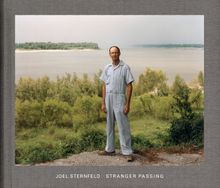 Joel Sternfeld: Stranger Passing
Joel Sternfeld: Stranger Passing
Published by Steidl.
Contributions by Douglas R. Nickel, Ian Frazier.
PUBLISHER
Steidl
BOOK FORMAT
Clth, 13.25 x 11.5 in. / 132 pgs / illustrated throughout.
PUBLISHING STATUS
Pub Date 8/15/2012
Out of stock indefinitely
DISTRIBUTION
D.A.P. Exclusive
Catalog: FALL 2014
PRODUCT DETAILS
ISBN 9783869304991 TRADE
List Price: $75.00 CAD $99.00
AVAILABILITY
Not available
STATUS: Out of stock indefinitely. |
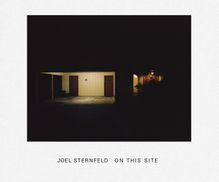 Joel Sternfeld: On This Site
Joel Sternfeld: On This Site
Published by Steidl.
Between 1993 and 1996, Joel Sternfeld photographed 50 infamous crime sites around the US. On This Site contains images of these unsettlingly normal places, ordinary landscapes left behind after tragedies, their hidden stories disturbingly invisible. Each photograph is accompanied by a text describing the crime that took place at the location. This is the first Steidl edition of On This Site, originally published in 1996 to great acclaim.
PUBLISHER
Steidl
BOOK FORMAT
Clth, 11.5 x 9.75 in. / 112 pgs / illustrated throughout.
PUBLISHING STATUS
Pub Date 7/15/2012
Out of stock indefinitely
DISTRIBUTION
D.A.P. Exclusive
Catalog: FALL 2014
PRODUCT DETAILS
ISBN 9783869304342 TRADE
List Price: $65.00 CAD $87.00
AVAILABILITY
Not available
STATUS: Out of stock indefinitely. |
 Joel Sternfeld: Walking the High Line
Joel Sternfeld: Walking the High Line
Published by Steidl.
Contributions by Adam Gopnik, John Stilgoe.
A major exponent of color photography in America, Joel Sternfeld was born in New York City in 1944. He has received numerous awards including two Guggenheim fellowships, a Prix de Rome and the Citibank Photography Award. Sternfeld's books include On This Site (1997), Hart Island (1998), Stranger Passing (2001), Sweet Earth (2006), When It Changed(2007), Oxbow Archive (2008) and First Pictures (2011).
PUBLISHER
Steidl
BOOK FORMAT
Clth, 10.25 x 8.5 in. / 72 pgs / illustrated throughout.
PUBLISHING STATUS
Pub Date 9/20/2012
Out of print
DISTRIBUTION
D.A.P. Exclusive
Catalog: FALL 2014
PRODUCT DETAILS
ISBN 9783865219824 TRADE
List Price: $30.00 CAD $40.00
AVAILABILITY
Not available
STATUS: Out of print | 00/00/00 For assistance locating a copy, please see our list of recommended out of print specialists |
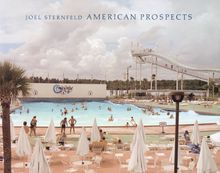 Joel Sternfeld: American Prospects
Joel Sternfeld: American Prospects
Published by D.A.P./Distributed Art Publishers.
Text by Kerry Brougher, Andy Grundberg, Anne W. Tucker.
A major exponent of color photography in America, Joel Sternfeld was born in New York City in 1944. He has received numerous awards including two Guggenheim fellowships, a Prix de Rome and the Citibank Photography Award. Sternfeld’s other books include On This Site (1997), Hart Island (1998), Stranger Passing (2001), Walking the High Line (2002), Sweet Earth (2006), When It Changed (2007), Oxbow Archive (2008) and First Pictures (2011).
PUBLISHER
D.A.P./Distributed Art Publishers
BOOK FORMAT
Clth, 14.5 x 11.75 in. / 140 pgs / 66 color.
PUBLISHING STATUS
Pub Date 9/30/2012
Out of print
DISTRIBUTION
D.A.P. Exclusive
Catalog: FALL 2012 p. 6
PRODUCT DETAILS
ISBN 9781935202974 TRADE
List Price: $50.00 CAD $67.50 GBP £45.00
AVAILABILITY
Not available
STATUS: Out of print | 00/00/00 For assistance locating a copy, please see our list of recommended out of print specialists |
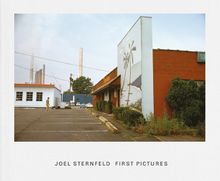 Joel Sternfeld: First Pictures
Joel Sternfeld: First Pictures
Published by Steidl.
Contributions by Jessica May.
A major figure in the photography world, Joel Sternfeld was born in New York City in 1944. He has received numerous awards including two Guggenheim fellowships, a Prix de Rome and the Citibank Photography Award. Sternfeld's books published by Steidl include American Prospects (2003), Sweet Earth (2006) and Oxbow Archive (2008).
PUBLISHER
Steidl
BOOK FORMAT
Clth, 11.5 x 9.5 in. / 324 pgs / illustrated throughout.
PUBLISHING STATUS
Pub Date 7/7/2011
Out of stock indefinitely
DISTRIBUTION
D.A.P. Exclusive
Catalog: FALL 2014
PRODUCT DETAILS
ISBN 9783869303093 TRADE
List Price: $75.00 CAD $99.00
AVAILABILITY
Not available
STATUS: Out of stock indefinitely. |
 Joel Sternfeld: iDubai
Joel Sternfeld: iDubai
Published by Steidl Photography International.
Text by Jonathan Crary.
PUBLISHER
Steidl Photography International
BOOK FORMAT
Hardcover, 8 x 10 in. / 160 pgs / 70 color.
PUBLISHING STATUS
Pub Date 5/31/2010
Active
DISTRIBUTION
D.A.P. Exclusive
Catalog: FALL 2009 p. 68
PRODUCT DETAILS
ISBN 9783865219169 TRADE
List Price: $40.00 CAD $54.00
AVAILABILITY
In stock
in stock $40.00 Free Shipping UPS GROUND IN THE CONTINENTAL U.S. |
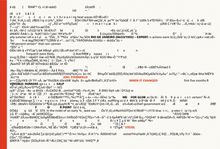 Joel Sternfeld: When It Changed
Joel Sternfeld: When It Changed
Published by Steidl.
Text by Gretel Ehrlich, Jeremy Leggett.
PUBLISHER
Steidl
BOOK FORMAT
Paperback, 9 x 6 in. / 170 pgs / 53 color
PUBLISHING STATUS
Pub Date 4/1/2008
Active
DISTRIBUTION
D.A.P. Exclusive
Catalog: FALL 2006 p. 81
PRODUCT DETAILS
ISBN 9783865212788 TRADE
List Price: $35.00 CAD $47.50
AVAILABILITY
In stock
in stock $35.00 Free Shipping UPS GROUND IN THE CONTINENTAL U.S. |
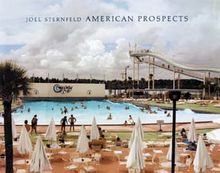 Joel Sternfeld: American Prospects
Joel Sternfeld: American Prospects
Published by D.A.P./Distributed Art Publishers.
Essays by Kerry Brougher, Andy Grundberg and Anne W. Tucker.
PUBLISHER
D.A.P./Distributed Art Publishers
BOOK FORMAT
Hardcover, 14.5 x 11.75 in. / 140 pgs / 65 color.
PUBLISHING STATUS
Pub Date 2/2/2004
Out of print
DISTRIBUTION
D.A.P. Exclusive
Catalog: FALL 2003 p. 29
PRODUCT DETAILS
ISBN 9781891024771 TRADE
List Price: $75.00 CAD $90.00
AVAILABILITY
Not available
STATUS: Out of print | 00/00/00 For assistance locating a copy, please see our list of recommended out of print specialists |
